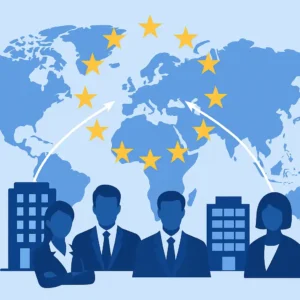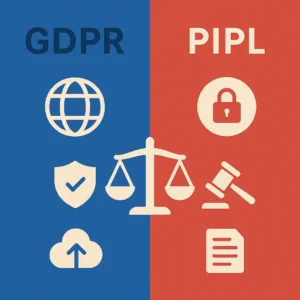GDPR translation has become a crucial topic for global companies expanding between Europe and China. One question keeps coming up: does the EU’s GDPR apply to Chinese businesses? The answer is yes — sometimes. In this post, you’ll learn when and why GDPR applies to China, what China’s own data laws (like PIPL) require, and how all of this affects translation and localization projects in 2025.
1. Why GDPR Translation Matters Outside Europe

The General Data Protection Regulation (GDPR) isn’t just a European issue anymore.
When it took effect in 2018, its goal was simple: protect the personal data of anyone in the European Union.
But here’s what made GDPR different:
it doesn’t only apply to EU companies — it also applies to any organization, anywhere in the world, that processes personal data belonging to EU citizens.
That includes:
- Chinese companies with European customers,
- international e-commerce platforms,
- global logistics firms,
- and even translation agencies handling documents for EU clients.
In other words, if your business touches European data, GDPR follows you.
2. Does GDPR Apply to China?
Yes — GDPR can apply to Chinese companies in certain situations.
If a company in China:
- sells goods or services to EU citizens,
- monitors EU users online (through cookies, analytics, or apps), or
- receives personal data from EU partners,
then it must comply with GDPR’s main principles:
lawful consent, transparency, limited use, and secure processing.
For example:
- A Chinese e-commerce platform selling to France or Germany must follow GDPR.
- A Chinese translation company handling EU customers’ data must follow GDPR.
- A multinational with branches in both Beijing and Paris must ensure internal data transfers meet GDPR standards.
So yes — GDPR can apply to China, depending on the nature of the data and the target audience.
3. Why GDPR Matters for Translation Companies
Let’s make this practical.
Translation agencies and localization teams often handle:
- employee records,
- product manuals,
- marketing content with customer data,
- or scanned personal documents like passports or diplomas.
If the original data belongs to an EU resident — GDPR applies, even if the translation team is outside Europe.
That means:
- files must be transmitted securely,
- translators must sign confidentiality agreements,
- and data should not be shared or stored indefinitely.
For cross-border projects, agencies like AZ-LOC act as data processors, while clients remain data controllers.
Both sides share responsibility for keeping information safe.
4. China’s Own Privacy Rules: PIPL, DSL, and CSL
While Europe has GDPR, China has its own set of privacy laws.
Together, they form a strong framework similar in spirit — but with Chinese characteristics.
a) PIPL — Personal Information Protection Law (since 2021)
Often called “China’s GDPR,” PIPL governs how companies collect, use, and transfer personal information.
It applies to both Chinese and foreign organizations that handle data of individuals located in China.
Key points:
- Requires clear, informed consent before collecting data.
- Sets limits on how long data can be kept.
- Gives individuals rights to access and correct their data.
- Restricts cross-border data transfers unless certain safeguards exist.
b) DSL — Data Security Law (2021)
Focuses on national security and “important data.”
Companies must classify data based on sensitivity and protect it accordingly.
c) CSL — Cybersecurity Law (2017)
The first of the three, CSL governs how networks, platforms, and IT infrastructure must ensure security.
Together, these laws mean that by 2025, China has built its own comprehensive data-protection ecosystem — one that complements GDPR but also has unique local rules.
The PIPL is more than just a legal framework — it’s part of China’s strategy to build digital trust both domestically and internationally. By defining clear boundaries on how personal information can be collected, transferred, and stored, it gives Chinese citizens greater control over their data while holding organizations accountable for misuse. For global businesses and translation companies, this means adapting to a dual system: following GDPR when handling data from the EU, and complying with PIPL when working with content or clients in China. In practice, that requires clear consent forms, transparent file-handling policies, and secure, localized storage for projects involving Chinese data.
5. Does China Require Data Localization?
Yes — China enforces data localization in specific cases.
That means certain data collected in China must be stored on servers physically located inside the country.
Under PIPL and DSL, the following organizations must localize their data:
- “Critical information infrastructure operators” (banks, telecoms, government suppliers, etc.);
- companies handling “important data” or large-scale personal information;
- firms conducting cross-border transfers that could affect national security.
For most small businesses or translation agencies, this doesn’t automatically apply.
But if you process large amounts of Chinese citizens’ personal data or government-related documents, data localization may be required.
In short:
Every file transfer between the EU and China must respect both GDPR’s export rules and China’s data-transfer restrictions.
That’s why professional translation companies now design dual-compliant workflows — ensuring no law is violated on either side.
6. GDPR vs. PIPL: Similar Goals, Different Systems

Here’s a quick side-by-side look:
| Aspect | GDPR (EU) | PIPL (China) |
|---|---|---|
| Scope | Applies to data of EU citizens, anywhere in the world | Applies to data of individuals in China |
| Consent | Must be explicit and specific | Must be informed and separate for each purpose |
| Cross-border transfers | Allowed with safeguards (Standard Clauses, Binding Rules) | Requires security review or standard contracts |
| Data subject rights | Access, correction, deletion, portability | Access, correction, deletion |
| Fines | Up to €20 million or 4% of annual turnover | Up to ¥50 million or 5% of annual turnover |
| Supervisory authority | National Data Protection Authorities (EU countries) | Cyberspace Administration of China (CAC) |
So while both frameworks aim to protect individuals’ data, PIPL gives more power to regulators and emphasizes national security.
Meanwhile, GDPR focuses on individual rights and cross-border business accountability.
7. What This Means for Cross-Border Translation Projects
Translation agencies that work between Europe and China — like AZ-LOC — must navigate both systems carefully.
Here’s how responsible agencies handle it:
- Secure Data Transfer
Files move only through encrypted or EU-hosted servers.
No free file-sharing links or public AI tools. - Informed Consent
Clients know exactly why their files are collected and how they’ll be used. - Confidential Agreements
Every translator signs an NDA that covers both GDPR and PIPL principles. - Data Minimization
Only relevant project files are shared; unnecessary details are removed or anonymized. - Timely Deletion
Source and translated files are deleted after the project or upon client request. - Local Awareness
If a project involves Chinese personal data, it’s processed under local storage and consent rules.
This approach keeps both EU and Chinese regulators satisfied — and, more importantly, keeps clients’ trust intact.
8. The Risks of Ignoring Data Laws
It’s tempting for small businesses or freelancers to think:
“I’m too small to worry about GDPR or PIPL.”
Unfortunately, even one careless mistake — like uploading a client’s contract into a public AI engine — can lead to serious consequences.
Examples:
- EU companies have received fines exceeding €10 million for poor data protection.
- In China, regulators have shut down websites and revoked licenses for unauthorized cross-border transfers.
For translation professionals, the bigger cost isn’t legal — it’s reputational.
Clients won’t return to a provider who can’t guarantee privacy.
9. The Future of Global Data Protection

As 2025 unfolds, the world is moving toward a convergence of privacy standards.
GDPR and PIPL have set the tone for dozens of other countries.
We’re entering an era where privacy is part of quality.
Just as ISO 17100 defines translation quality, data protection defines professional credibility.
We can expect to see:
- AI and privacy regulations merging,
- tighter rules on cross-border cloud storage,
- and increased transparency requirements for companies handling international data.
Translation agencies that adapt early will stand out as trustworthy global partners.
10. What Clients Can Do to Protect Themselves
If you’re hiring a translation company — in Europe, China, or anywhere — here’s a quick checklist:
✅ Ask where your files are stored.
✅ Confirm how long the agency keeps them.
✅ Check whether translators sign confidentiality agreements.
✅ Read the agency’s privacy policy — it should mention GDPR or similar laws.
✅ Avoid sending sensitive documents through open email or public upload links.
And remember: a professional translation partner will never hesitate to answer these questions.
Transparency is part of trust.
Ready to translate securely and confidently?
At AZ-Loc, every translation project is handled with full GDPR and PIPL compliance — from your first document upload to final delivery.
Let’s make your content accurate, compliant, and ready for global markets.
